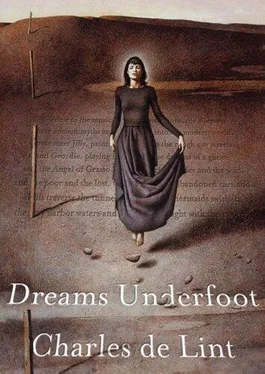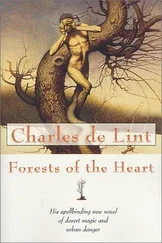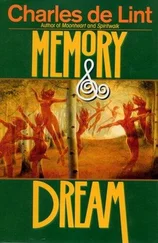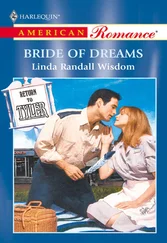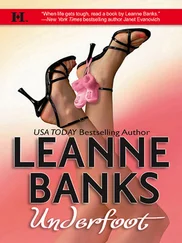Her mother had a package wrapped in brown paper and twine in her hands when she came back.
She sat down across from me again and laid the package on the table between us.
“Granny told me a story once,” she said, “about her first and only real true love. It was an odd story, a kind of ghost story, about how she’d once lived in the future until granddad’s love stole her away from her own time and brought her to his.” She gave me an apologetic smile. “I knew it was just a story because, when I was growing up I’d met people she’d gone to school with, friends from her past before she met granddad. Besides, it was too much like some science fiction story.
“But it was true, wasn’t it?”
I could only nod. I didn’t understand how Sam and everything about her except my memories of her could vanish into the past, how she could have a whole new set of memories when she got back there, but I knew it was true.
I accepted it now, just as Jilly had been trying to get me to do for years. When I looked at Sam’s granddaughter, I saw that she accepted it as well.
“When her effects were sent to me,” she went on, “I found this package in them. It’s addressed to you.”
I had seen my name on it, written in a familiar hand. My own hand trembled as I reached over to pick it up.
“You don’t have to open it now,” she said.
I was grateful for that.
“I ... I’d better go,” I said and stood up. “Thank you for taking the time to see me.”
That sad smile was back as she saw me to the door.
“I’m glad I got the chance to meet you,” she said when I stepped out onto the porch.
I wasn’t sure I could say the same. She looked so much like Sam, sounded so much like Sam, that it hurt.
“I don’t think we’ll be seeing each other again,” she added. No. She had her husband, her family. I had my ghosts. “Thanks,” I said again and started off down the walk, fiddlecase in one hand, the brown paper package in the other.
I didn’t open the package until I was sitting in the Silenus Gardens in Fitzhenry Park, a place that always made me feel good; I figured I was going to need all the help I could get. Inside there was a book with a short letter. The book I recognized. It was the small J. M. Dent & Sons edition of Shakespeare’s A Midsummer Night’s Dream that I’d given Sam because I’d known it was one of her favorite stories.
There was nothing special about the edition, other than its size—it was small enough for her to carry around in her purse, which she did. The inscription I’d written to her was inside, but the book was far more worn than it had been when I’d first given it to her. I didn’t have to open the book to remember that famous quotation from Puck’s final lines:
If we shadows have offended, Think but this, and all is mended, That you have but slumber’d here, While these visions did appear. And this weak and idle theme, No more yielding but a dream ...
But it hadn’t been a dream—not for me, and not for Sam. I set the book down beside me on the stone bench and unfolded the letter.
“Dear Geordie,” it said. “I know you’ll read this one day, and I hope you can forgive me for not seeing you in person, but I wanted you to remember me as I was, not as I’ve become. I’ve had a full and mostly happy life; you know my only regret. I can look back on our time together with the wisdom of an old woman now and truly know that all things have their time. Ours was short—too short, my heart—but we did have it.
“Who was it that said, ‘better to have loved and lost, than never to have loved at all’? We loved and lost each other, but I would rather cherish the memory than rail against the unfairness. I hope you will do the same.”
I sat there and cried. I didn’t care about the looks I was getting from people walking by, I just let it all out. Some of my tears were for what I’d lost, some were for Sam and her bravery, and some were for my own stupidity at denying her memory for so long.
I don’t know how long I sat there like that, holding her letter, but the tears finally dried on my cheeks.
I heard the scuff of feet on the path and wasn’t surprised to look up and find Jilly standing in front of me.
“Oh Geordie, me lad,” she said.
She sat down at my side and leaned against me. I can’t tell you how comforting it was to have her there. I handed her the letter and book and sat quietly while she read the first and looked at the latter.
Slowly she folded up the letter and slipped it inside the book.
“How do you feel now?” she asked finally. “Better or worse?”
“Both.”
She raised her eyebrows in a silent question.
“Well, it’s like what they say funerals are for,” I tried to explain. “It gives you the chance to say goodbye, to settle things, like taking a—” I looked at her and managed to find a small smile “—final turn on a wheel. But I feel depressed about Sam. I know what we had was real, and I know how it felt for me, losing her. But I only had to deal with it for a few years. She carried it for a lifetime.”
“Still, she carried on.”
I nodded. “Thank god for that.”
Neither of us spoke for awhile, but then I remembered Paperjack. I told her what I thought had happened last night, then showed her the fortunetelling device that he’d left with me in St. Paul’s. She read my fortune with pursed lips and the start of a wrinkle on her forehead, but didn’t seem particularly surprised by it.
“What do you think?” I asked her.
She shrugged. “Everybody makes the same mistake. Fortunetelling doesn’t reveal the future; it mirrors the present. It resonates against what your subconscious already knows and hauls it up out of the darkness so that you can get a good look at it.”
“I meant about Paperjack.”
“I think he’s gone—back to wherever it was that he came from.” She was beginning to exasperate me in that way that only she could.
“But who was he?” I asked. “No, better yet, what was he?”
“I don’t know,” jilly said. “I just know it’s like your fortune said. It’s the questions we ask, the journey we take to get where we’re going that’s more important than the actual answer. It’s good to have mysteries. It reminds us that there’s more to the world than just making do and having a bit of fun.”
I sighed, knowing I wasn’t going to get much more sense out of her than that.
It wasn’t until the next day that I made my way alone to Paperjack’s camp in back of the Beaches.
All his gear was gone, but the paper stars still hung from the trees. I wondered again about who he was.
Some oracular spirit, a kind of guardian angel, drifting around, trying to help people see themselves? Or an old homeless black man with a gift for folding paper? I understood then that my fortune made a certain kind of sense, but I didn’t entirely agree with it.
Still, in Sam’s case, knowing the answer had brought me peace.
I took Paperjack’s fortuneteller from my pocket and strung it with a piece of string I’d brought along for that purpose. Then I hung it on the branch of a tree so that it could swing there, in among all those paper stars, and I walked away.
Nothing is too wonderful to be true.
—Michael Faraday
For the longest time, I thought she was a ghost, but I know what she is now. She’s come to mean everything to me; like a lifeline, she keeps me connected to reality, to this place and this time, by her very capriciousness.
I wish I’d never met her.
That’s a lie, of course, but it comes easily to the tongue. It’s a way to pretend that the ache she left behind in my heart doesn’t hurt.
Читать дальше
